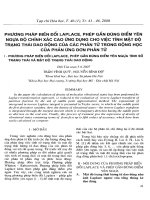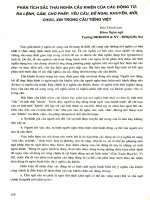REPORTED A.Thì của các động từ trong lời nói gián tiếp thay đổi theo một nguyên tắc chung là lùi về quá khứ
Bạn đang xem bản rút gọn của tài liệu. Xem và tải ngay bản đầy đủ của tài liệu tại đây (90.37 KB, 4 trang )
A. Thì của các động từ trong lời nói gián tiếp thay đổi theo một nguyên tắc chung là lùi về quá khứ
Câu trực tiếp
Câu gián tiếp
Hiện tại đơn
-> Quá khứ đơn
Hiện tại tiếp diễn
-> Quá khứ tiếp diễn
Hiện tại hoàn thành
-> Quá khứ hoàn thành
Quá khứ đơn
-> Quá khứ hoàn thành
Quá khứ tiếp diễn
-> Quá khứ hoàn thành tiếp diễn
Tương lai đơn: will/ shall
-> would/ should
Tương lai gần: be going to
-> was/were going to
B. Thay đổi một số động từ khuyết thiếu:
Trực tiếp
Gián tiếp
can
could
will
would
shall
should
must
had to/must
may
might
C.Các đại từ nhân xưng và đại sở hữu khi chuyển từ lời nóitr ực tiếp sang lời nói gián tiếp thay đổi như bảng
sau:
Đại từ
Câu trực tiếp
Đại từ nhân xưng I
Đại từ sở hữu
Đại từ chỉ định
Câu gián tiếp
he/she
we
they
you
they/I/he/her
me
him/her
us
them
you
them/me/him/her
my
her/his
our
their
your
them/my/his/her
mine
his/hers
ours
theirs
yours
theirs/mine/his/hers
this
that
these
those
D. Các trạng từ chỉ nơi chốn, thời gian:
Trực tiếp
Gián tiếp
Here
There
Now
Then
Today
That day
Ago
Before
Tomorrow
The next day / the following day
The day after tomorrow
In two day’s time / two days after
Yesterday
The day before / the previous day
The day before yesterday
Two day before
Next week
The following week
Last week
The previous week / the week before
Last year
The previous year / the year before
CÂU PHÁT BIỂU : S + SAID THAT/TOLD THAT + S + VHẠTHÌ + ..... ( BIẾN ĐỔI THỜI GIAN )
VD: She said “My father is travelling in America”. -> She said that her father was travelling in America.
1. Nam said “I am told to be at school before 7 o’clock”
2. Thu said “All the students will have a meeting next week”
3. Phong said “My parents are very proud of my good marks”
4. The teacher said “All the homework must be done carefully”
5. Her father said to her “You can go to the movie with your friend”
6. Hoa said “I may visit my parents in the summer”
7. The teacher said “We can collect old book for the poor students”
8. She said “She doesn’t buy this book”
CÂU MỆNH LỆNH: S + TOLD/ASKED +O + ( NOT ) + TO + VO
VD:
She said to me “close the door!” -> She asked me to close the door.
1. She said to him: “Give me another glass of wine”.
2. She said to me: “Bring me a book”.
3. Mother said to him: “Open the window please!”.
4. He said to me: “Shut the door after you”.
5. The captain said to them: “Wait here still I come back”.
CÂU HỎI : S + ASKED ( + SB) + IF/WHETHER + S + VHẠTHI
WH-/HOW
Vd: She said “Do you want to go with me?”-> She asked if/whether I wanted to go with her.
Vd: He asked “what time will you come?”-> He asked what time I would come.
=> Nếu có các từ ( what, which, why,.... how) thì giữ nguyên. Còn nếu à trợ động từ do, does thì mượn
if/whether
1. “How much does this dress cost?” Lan asked Lien
2. Ba asked Tam “How often do you wash your clothes?”
3. “Do you enjoy reading?” Phong asked Peter
4. “When will your father leave Vietnam for the USA?” Phong asked Thu
5. “Does she like sports?” Hoa asked Lan
6. “How many people are there in your family?” She asked Lan
7. “Do your sister and brother go to the same school?” She asked Nam
8. Tam’s friend asked him “How long will you stay in England?”
9. “Are there some oranges in the fridge?” She asked her mom
10. “Will it rain tomorrow morning?” He asked his friend









